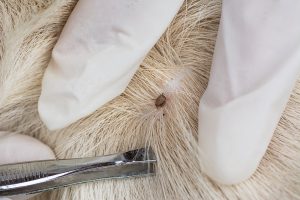 Springtime is on the way and along with it comes seasonal allergies and parasites. RBVH is here to help!
Springtime is on the way and along with it comes seasonal allergies and parasites. RBVH is here to help!
Seasonal allergies in the dog and cat are very different from humans. Dogs and cats show signs of allergy on their skin. They can seem itchy and develop infections of the skin and ears.
- Your veterinarian may recommend antihistamines as the first line of defense for mild seasonal allergies
- Over-the-counter antihistamines that contain decongestants can be toxic to dogs so be sure to follow your veterinarian’s recommendations closely.
- Your veterinarian may also prescribe different medications to help control your pet’s season allergies and itchiness.
Many seasonal skin problems in dogs and cats are the result of exposure to fleas and ticks.
Preventives:
- Flea and tick preventives promote long-term health and wellness of your pet. When you give your pet flea and tick preventive medication, you are offering inside and outside protection because fleas and ticks carry bacteria and parasites that can cause serious, and even fatal disease, in domestic animals.
- You also protect your family as flea and tick bites can transmit disease to humans too!
- Lyme disease, Rocky Mountain spotted fever, cat scratch fever, and tapeworms can all be transmitted to humans from ticks and fleas.
- Dog and cat flea and tick preventives aren’t all created equally. Many medications that are labeled for dogs contain a synthetic compound called permethrin, which is safe for dogs but toxic to cats. If a product containing permethrin is mistakenly applied to a cat or ingested by a cat, it can cause seizures, coma, and even death.
- Talk with your veterinary team about ways to keep your pets safe from fleas, ticks, and toxic compounds.
- Your veterinarian is the best person to help choose a preventive product that is best for your pet’s individual needs.
Fleas
The common cat flea infects both dogs and cats – Ctenocephalides felis. In addition to skin irritation, fleas can also cause anemia and, in certain situations, death – especially when young animals experience large infestations. Adding insult to irritation, fleas can spread multiple pathogens such as tapeworms, cat scratch fever bacteria, and other bacterial diseases that can infect both people and pets.
If You Find a Tick on Your Pet
- Wear rubber gloves! Ticks can transmit diseases to humans too.
- Use tweezers or a tick removal tool to grasp the tick as close as possible to the skin using a slow, steady, rearward pressure to release the tick from the skin.
- Dispose of the tick by placing it in alcohol or flushing it down the toilet. Or you may keep the tick in a sealed container and take it to your veterinarian to identify or to send out for further testing.
- Clean the skin with soap and water after removing the tick.
Things to Avoid
- Don’t try burning the tick with a lit match or other heat sources. This will hurt your pet and potentially spread infections into the air.
- Don’t try suffocating or irritating the tick with fingernail polish or petroleum jelly.
- Don’t crush or twist the tick. That’s a fast way to expose your pet to more pathogens and cause the mouthparts to break off.
If you think your pet has allergies, contact RBVH today at 732-747-3636. RBVH serves pets in the Tinton Falls, Mt. Laurel, and Hillsborough areas of New Jersey. The veterinary dermatology team at RBVH can diagnose allergies and help your pet find a treatment that provides relief.
 Springtime is on the way and along with it comes seasonal allergies and parasites. RBVH is here to help!
Springtime is on the way and along with it comes seasonal allergies and parasites. RBVH is here to help!